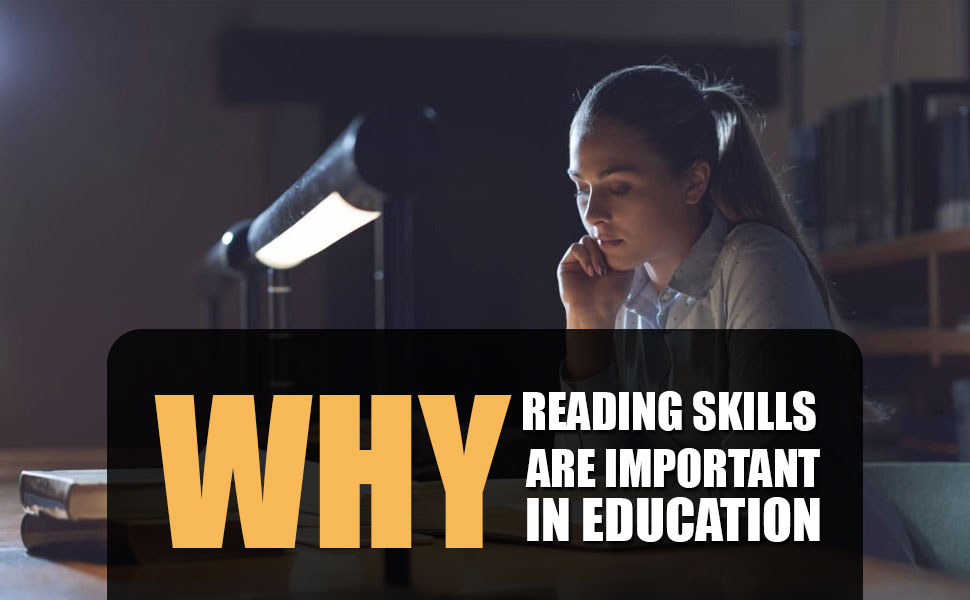You can become a better writer and speaker by reading. By personalizing how you read, your reading skills can put you one step ahead and help in the achievement of your goals. A good reading strategy or techniques can enhance your reading experience and assist you in reaching your objectives.
There are different reading skills. You can use your extensive reading techniques if you like to read for pleasure. The reader is not expected to understand this, and you can determine the meaning of words by looking at the context. Intensive reading is another skill that is used most often. Here, you have to pay proper attention to understand every word.
Importance of Reading Skills In Education – How to Improve Reading Skills?
Reading can be beneficial for preparing for competitive exams because it helps one increase their knowledge. Some reading strategy or skills are achieved through extensive reading, which is a crucial component of our school system and will be helpful when getting ready for future exams. The following points will explain why reading skills are important in education.
1. Improved Concentration
Reading frequently and consistently can improve a child’s ability to concentrate. Additionally, a child will learn to focus and pay attention for protracted periods, which will benefit them in school. Reading also forces the reader to sort out the things in their mind.
2. Stronger Memory Skills
Make reading a thought. Even a school-age child with a relatively straightforward book must remember the cast of characters, the scene, and earlier events. Reading improves one’s capacity for memory retention. That is an effective tool for younger students and older adults.
3. Expanded Vocabulary
One of the best ways to help your child expand their vocabulary and strengthen their spelling abilities is to open up the world for them. When you learn something new while having fun, it usually sticks and doesn’t even feel like work! Reading frequently can help readers become more effective communicators, both verbally and in writing.
4. Self Esteem
Self-esteem could be the most crucial area of all. Students will learn to read earlier if they make more progress in the areas listed below. As a result of their increased knowledge, they consequently gain confidence in their writing, speaking, and self.
Those who have read a lot will inevitably be asked to respond to more questions, which is another way to boost a young student’s confidence.
5. Critical and Analytical Thinking Skills
The classic, in this case, is when a young reader gets sucked into a mystery novel (Hardy Boys or Nancy Drew are two examples of generations of Americans) and manages to figure out the solution before the books do. That serves as a straightforward illustration of how reading can help students improve their critical and analytical thinking, which persists even after they put the book down.
How Can Teachers Encourage Reading?
Reading to your class will likely come naturally to you if you are a teacher. There are some things that teachers can do to encourage reading in their students. As an example, a teacher could:
- Teachers could put together a twice-weekly newsletter that summarizes what their class has read and why during that period.
- Teachers could start a book club with your class or with students all over the school. You could mandate that kids read a book at home every week or month as part of this. Then, through regular meetings, assess their comprehension of and interest in that book.
- Teachers can set a good example by talking to students about a book they’ve recently read. Students can be encouraged to read independently by hearing from teachers that they enjoy reading.
What can parents do to help their kids read better?
Children who feel reading is difficult may also lack interest in what they are reading, which can lead to reading difficulties. Parents who want to assist their children in reading well should encourage good reading habits.
- Read to your child: It is never too early to begin reading to your child and reading aloud as a family can be a fun and healthy activity. Reading aloud to young children exposes them to new words that will improve their language abilities. Early interaction with books helps establish the activity as a routine.
- Read to Yourself: If your child sees you reading frequently, they are more likely to become interested in reading themselves. Choose a book you enjoy, and read it whenever you can. Your kid will pick things up from you.
- Surround them with Book: Reading is crucial because words are the foundation of existence. Your child’s interest in reading will soar if they read something they enjoy. So, help them figure out what interests them. Your kid’s reading progress will amaze you if you get them excited about it.
Conclusion
We discussed the importance of reading comprehension skills in the classroom in this article. We discuss the most effective reading strategies for encouraging kids to read at home and school. We hope you have realized the importance of reading and will start doing so regularly.



